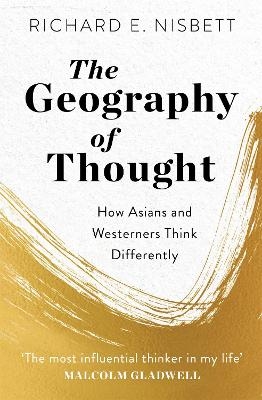
The Geography of Thought
How Asians and Westerners Think Differently
Seiten
2019
John Murray Business (Verlag)
978-1-5293-0941-6 (ISBN)
John Murray Business (Verlag)
978-1-5293-0941-6 (ISBN)
How people actually experience - and even see - the world differently, because of differing ecologies, social structures, philosophies, and educational systems that date back to ancient Greece and China, and that have survived into the modern world.
'The most influential thinker, in my life, has been the psychologist Richard Nisbett. He basically gave me my view of the world.'
-Malcolm Gladwell
"One of the world's leading thinkers" Daily Telegraph
When Richard Nisbett showed an animated underwater scene to his American students, they zeroed in on a big fish swimming among smaller fish. Japanese subjects, on the other hand, made observations about the background environment...and the different "seeings" are a clue to profound underlying cognitive differences between Westerners and East Asians.
As Professor Nisbett shows in The Geography of Thought people actually think - and even see - the world differently, because of differing ecologies, social structures, philosophies, and educational systems that date back to ancient Greece and China, and that have survived into the modern world. As a result, East Asian thought is "holistic" - drawn to the perceptual field as a whole, and to relations among objects and events within that field.
By comparison to Western modes of reasoning, East Asian thought relies far less on categories, or on formal logic; it is fundamentally dialectic, seeking a "middle way" between opposing thoughts. By contrast, Westerners focus on salient objects or people, use attributes to assign them to categories, and apply rules of formal logic to understand their behaviour.
'The most influential thinker, in my life, has been the psychologist Richard Nisbett. He basically gave me my view of the world.'
-Malcolm Gladwell
"One of the world's leading thinkers" Daily Telegraph
When Richard Nisbett showed an animated underwater scene to his American students, they zeroed in on a big fish swimming among smaller fish. Japanese subjects, on the other hand, made observations about the background environment...and the different "seeings" are a clue to profound underlying cognitive differences between Westerners and East Asians.
As Professor Nisbett shows in The Geography of Thought people actually think - and even see - the world differently, because of differing ecologies, social structures, philosophies, and educational systems that date back to ancient Greece and China, and that have survived into the modern world. As a result, East Asian thought is "holistic" - drawn to the perceptual field as a whole, and to relations among objects and events within that field.
By comparison to Western modes of reasoning, East Asian thought relies far less on categories, or on formal logic; it is fundamentally dialectic, seeking a "middle way" between opposing thoughts. By contrast, Westerners focus on salient objects or people, use attributes to assign them to categories, and apply rules of formal logic to understand their behaviour.
Richard E. Nisbett, Ph.D., has taught psychology at Yale University and the University of Michigan, where he is the Theodore M. Newcomb Distinguished University Professor. He received the Distinguished Scientific Contribution Award of the American Psychological Association, the William James Fellow Award, and a Guggenheim Fellowship and in 2002 became the first social psychologist elected to the National Academy of Sciences in a generation. The co-author of Culture of Honor and numerous other books and articles, he lives in Ann Arbor, Michigan.
| Erscheinungsdatum | 02.07.2019 |
|---|---|
| Sprache | englisch |
| Maße | 128 x 196 mm |
| Gewicht | 206 g |
| Themenwelt | Geisteswissenschaften ► Psychologie ► Allgemeine Psychologie |
| Geisteswissenschaften ► Psychologie ► Verhaltenstherapie | |
| ISBN-10 | 1-5293-0941-7 / 1529309417 |
| ISBN-13 | 978-1-5293-0941-6 / 9781529309416 |
| Zustand | Neuware |
| Haben Sie eine Frage zum Produkt? |
Mehr entdecken
aus dem Bereich
aus dem Bereich
Buch | Softcover (2024)
Hogrefe Verlag
CHF 46,50
wie Affekte innere Entwicklung ermöglichen
Buch | Softcover (2023)
Klett-Cotta (Verlag)
CHF 41,95


